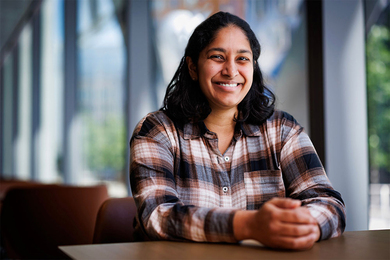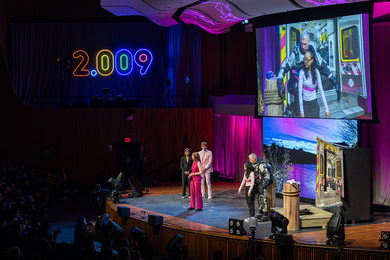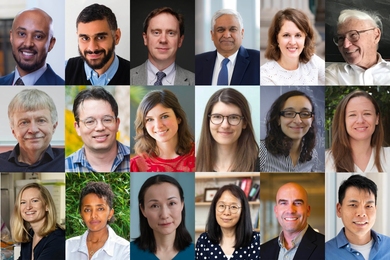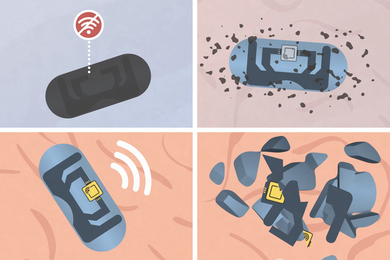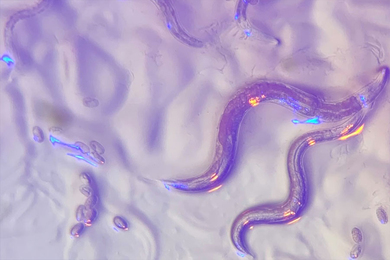A memorial service will be held at MIT this Saturday, Feb. 17 for Professor Emeritus Thomas H. Lee, a founder of the Center for Quality Management (CQM) who was a pioneer in developing modern management techniques. He died on February 4 in Massachusetts General Hospital at age 77 after a brief illness. The service is scheduled for 2pm in the Tang Center's Wong Auditorium.
Professor Lee, an employee of General Electric Co. in his native Shanghai, was undergoing training in the United States when the Communist takeover of China occurred. He and his wife chose to stay here and Professor Lee worked for GE in the United States for 30 years, earning an MS in electrical engineering from Union College in 1950 and a PhD from Renssalaer Polytechnic Institute in 1954.
He came to MIT as a visiting research scientist in 1979 and joined the electrical engineering faculty the following year. He became the Philip Sporn Professor of Energy Processing in 1982. He was also the director of the Laboratory for Electromagnetic and Electronic Systems and associate director of the Energy Laboratory. He was appointed director of the International Institute of Applied Systems Analysis in Vienna in 1984.
Professor Gerald L. Wilson, former dean of the School of Engineering, invited Professor Lee to join the faculty, hoping his ability to meld strategic thinking with technology would provide a new perspective. He did.
"Tom was a truly wonderful colleague," said Professor Wilson. "He was inevitably enthusiastic, often calling his colleagues at home with another new idea or concept. He made hundreds of friends in the Boston area and later worldwide due to his interest in learning about better management techniques and his great desire to share them with others. I don't think Tom ever stopped having fun."
Professor Edward Roberts, co-chair with Professor Lee of the Sloan School Management of Technology (MOT) program, said, "Tom Lee's insights into engineering and technology management and enthusiasm for the program's goals were instrumental to the MOT program's growth and success. He was a caring developer of both curricula and students."
Professor Lee joined CEOs and senior managers from seven greater Boston companies to found the CQM in 1989, a year after he retired from MIT. Other founders included Alexander V. d'Arbeloff, chair of the MIT Corporation, and Raymond S. Stata, a life member of the Corporation.
Mr. D'Arbeloff, a founder and former CEO of Teradyne Inc., said, "Tom Lee was a visionary who realized in the late 1980s that US industry was behind Japan in the ability to deliver consistently excellent implementation in engineering and manufacturing. Tom wanted to bring to the Boston area (and beyond) proven methodology for application in local companies. Along with Ray Stata, he formed the CQM and succeeded way beyond his initial ambition. I owe a lot to Tom personally and on behalf of Teradyne."
Mr. Stata, a founder of Analog Devices, said, "As the founder and spiritual leader of CQM, Tom brought together business practitioners and management thought leaders with the vision of integrating their ideas and best practices into a management system that would help organization leaders around the world achieve and sustain the highest levels of performance. In each of his distinct careers as inventor, chief scientist of GE, professor at MIT and management guru, Tom rose to the top ranks, always pushing the envelope, always searching for ways to make the world a different and better place... right up to the last day of his life."
Professor Joel Moses, a former dean of the School of Engineering, said, "Tom's role in the Center for Quality Management helped American industry successfully cope with the Japanese challenge to American manufacturing. The center's Cambridge location also gave MIT faculty and staff great opportunities to learn from and influence these important changes in American product design and manufacturing processes."
Professor Lee was president of CQM from 1990-98 and served on its board of directors. During this period, he worked with members to define the facets of an integrated management system. With Shoji Shiba and Robert Chapman Wood, he co-authored Integrated Management Systems: A Practical Approach to Transforming Organizations (John Wiley & Sons, 1999). He became president emeritus of CQM in 1998.
For the past three years, he studied worldwide anticorruption tactics with Transparency International. He was also instrumental in organizing CQM's new chapter in Shanghai, where he was born on May 11, 1923.
Professor Lee earned the BS in mechanical engineering in 1946 from Chiao Tung University and served in the Republic of China Army before joining GE in Shanghai. He was the pan-Asia doubles champion in table tennis while in college.
Professor Lee is survived by his wife, Kin Ping, of Boston and West Tisbury; three sons, William of Wellesley, Thomas Jr. of Milton and Richard of Weston; and eight grandchildren.
Donations in his memory may be made to the Chiao Tung University Alumni Association of America, 2 World Trade Center, Rm 1844, New York, NY 10048, Attn: Liang J. Chen, Stellar Services; or the Thomas H. Lee Memorial Fund, c/o Partners Healthcare System Development Office, 100 Charles River Plaza, Suite 600, Boston, MA 02214.
A version of this article appeared in MIT Tech Talk on February 14, 2001.
